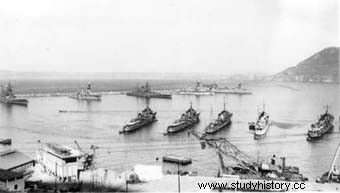
President Lebrun then appealed to the Marshal to form a government in which Admiral of the Fleet Darlan became Minister of the Navy, while continuing to assume the functions of Commander-in-Chief of the Naval Forces. Darlan was an ambitious, excellent sailor, who had done much during his career to bring the French Navy to a high degree of efficiency. By his ancestry, he was familiar with the world of politics. His allegiance to the marshal in the crisis experienced by France explains the tragic fate of the fleet placed under his sole military and political command. Many French buildings, while very modern, were not equipped with radars or sonars. The crews had proven themselves in the Norwegian campaign, escorting convoys and laying mines, and at Dunkirk, where casualties among small craft had been considerable. Despite these losses, the navy, unlike the army, had not disintegrated.
As the Germans advanced along the coasts, the French naval authorities, whose telecommunications network had remained intact, succeeded in evacuating from the ports of the Channel and the Atlantic all ships, merchant or military, able to take the sea. A few reached England, but most reached North Africa or French West Africa.
Thus, when Marshal Pétain asked for the armistice on June 17, two old battleships, eight torpedo boats and two hundred other warships were in Portsmouth or Plymouth. Two modern battlecruisers, six destroyers, two old battleships and an aircraft carrier were at Mers el-Kébir, a naval base near Oran. One battleship, four cruisers and three torpedo boats were anchored in Alexandria where they had cooperated with Admiral Cunningham's Eastern Mediterranean Squadron. There were six cruisers in Algiers and Bizerte was home to many submarines.
The new battleship Richelieu, which was undergoing trials, left Brest on June 18 for Dakar, while its "sister-ship", the Jean-Bart, which was not yet finished, was able to leave its drydock of Saint-Nazaire, the day before the arrival of the Germans, and reach Casablanca safe and sound. The rest, usually small vessels, remained in Toulon. The ships stationed in the distant colonies had only weak military potential.
During the various meetings between French and British ministers held since June 12, Darlan had solemnly pledged that no French warship would fall intact into German hands, and the French government had stated categorically that if the conditions of armistice included the surrender of the fleet, they would be rejected, whatever the consequences. On June 21, the French delegation was informed of the German conditions. Article 8 stipulated that the French fleet, with the exception of buildings necessary for the defense of the colonies, would be assembled in ports to be designated in principle as the normal home ports of ships in time of peace - and disarmed under German control. and Italian. The German government solemnly pledged not to use the French fleet for its own ends, with the exception of the buildings necessary for the defense of the coasts and for the sweeping of the mines, and not to claim it at the conclusion of the peace. Two articles prohibited the removal of any ship or aircraft from France, and no merchant ship was authorized to put to sea until further notice.
On learning of these conditions, the British ambassador in Bordeaux, Sir Ronald Campbell, immediately communicated them to London. He obviously did not know that the marshal had immediately ordered the French delegation to try to obtain amendments, especially to article 8, under the terms of which French ships would be authorized to be laid up in French ports in Africa. North or West.
The principle of this important concession was approved on the morning of June 22, at the very time when Churchill violently attacked, at B.B.C., the Pétain government for having accepted conditions which "would place not only France, but the French Empire at the mercy and power of the German and Italian dictators", and thanks to which "all the resources of the French Empire and of the French navy would pass without delay into the hands of the enemy, for the realization of his plans”.
Fortunately, these grim predictions did not come true.
But all contact had, alas! already ceased between London and the new French government. On the 23rd, Sir Ronald Campbell and all the embassy staff had left Bordeaux for Saint-Jean-de-Luz, where they embarked on a British cruiser for England. Just when London needed accurate information the most, communications with Bordeaux were becoming sporadic and questionable.
On the evening of the 22nd, the Germans, having accepted, in principle, the modifications to the clauses relating to the fleet, the French delegation received from the Marshal the authorization to sign. She immediately flew to Rome, where she obtained the consent of the Italians two days later. The conditions were finally ratified, on June 30, in Wiesbaden, where Germany formally accepted the French proposal to disarm the French buildings in the naval bases located out of reach of the German forces.
